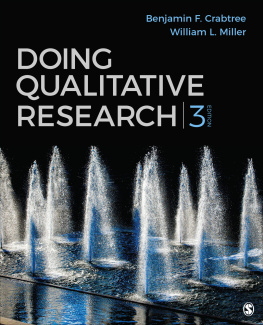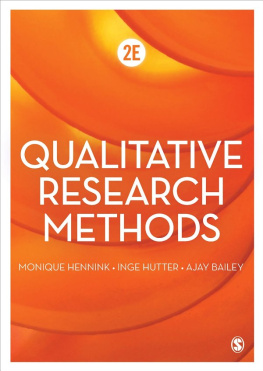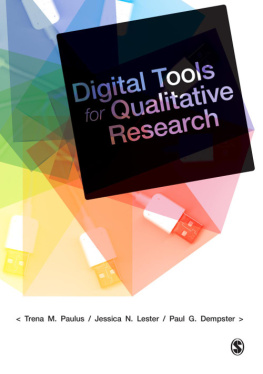Table of Contents
Introducing Research Methodology
Introducing Research Methodology
A Beginners Guide to Doing a Research Project
Second Edition
SAGE Publications Ltd
1 Olivers Yard
55 City Road
London EC1Y 1SP
SAGE Publications Inc.
2455 Teller Road
Thousand Oaks, California 91320
SAGE Publications India Pvt Ltd
B 1/I 1 Mohan Cooperative Industrial Area
Mathura Road
New Delhi 110 044
SAGE Publications Asia-Pacific Pte Ltd
3 Church Street
#10-04 Samsung Hub
Singapore 049483
Uwe Flick 2015
First published 2011. Originally published under the title SOZIAL FORSCHUNG Copyright 2009 by Rowohlt Verlag GmbH, Reinbek bei Hamburg
Apart from any fair dealing for the purposes of research or private study, or criticism or review, as permitted under the Copyright, Designs and Patents Act, 1988, this publication may be reproduced, stored or transmitted in any form, or by any means, only with the prior permission in writing of the publishers, or in the case of reprographic reproduction, in accordance with the terms of licences issued by the Copyright Licensing Agency. Enquiries concerning reproduction outside those terms should be sent to the publishers.
Library of Congress Control Number: 9781446294239
British Library Cataloguing in Publication data
A catalogue record for this book is available from the British Library
ISBN 978-1-4462-9423-9
ISBN 978-1-4462-9424-6 (pbk)
Editor: Katie Metzler
Assistant editor: Lily Mehrbod
Production editor: Ian Antcliff
Copyeditor: Sharon Cawood
Proofreader: Kate Campbell
Indexer: David Rudeforth
Marketing manager: Ben Griffin-Sherwood
Cover designer: Shaun Mercier
Typeset by: C&M Digitals (P) Ltd, Chennai, India
Printed and bound by CPI Group (UK) Ltd, Croydon, CR0 4YY
Table of Contents
List of Boxes
List of Figures
List of Tables
About the Author
Uwe Flickis Professor of Qualitative Research in Social Science and Education at the Free University of Berlin, Germany. He is a trained psychologist and sociologist and received his PhD from the Free University of Berlin in 1988 and his Habilitation from the Technical University of Berlin in 1994. He has been Professor of Qualitative Research at Alice Salomon University of Applied Sciences in Berlin, Germany and at the University of Vienna, Austria, where he continues to work as Guest Professor. Previously, he was Adjunct Professor at the Memorial University of Newfoundland in St. Johns, Canada; a Lecturer in research methodology at the Free University of Berlin; a Reader and Assistant Professor in qualitative methods and evaluation at the Technical University of Berlin; and Associate Professor and Head of the Department of Medical Sociology at the Hannover Medical School. He has held visiting appointments at the London School of Economics, the Ecole des Hautes Etudes en Sciences Sociales in Paris, Cambridge University (UK), Memorial University of St Johns (Canada), University of Lisbon (Portugal), Institute of Higher Studies in Vienna, in Italy and Sweden, and the School of Psychology at Massey University, Auckland (New Zealand). His main research interests are qualitative methods, social representations in the fields of individual and public health, vulnerability in fields like youth homelessness or migration, and technological change in everyday life. He is the author of
Designing Qualitative Research (Sage, 2007) and
Managing Quality in Qualitative Research (Sage, 2007) and editor of
The SAGE Qualitative Research Kit (Sage, 2007),
A Companion to Qualitative Research (Sage, 2004),
Psychology of the Social (Cambridge University Press, 1998),
Quality of Life and Health: Concepts, Methods and Applications (Blackwell Science, 1995) and
La perception quotidienne de la Sant et la Maladie: Thories subjectives et Reprsentations sociales (LHarmattan, 1993). His most recent publications are the fifth edition of
An Introduction to Qualitative Research (Sage, 2014) and
The SAGE Handbook of Qualitative Data Analysis (editor, Sage, 2014).
Preface to the Second Edition
Two main developments have shaped the context of this book. First, the political and practical relevance of social research has grown. Empirically based knowledge on such issues as the gap between rich and poor, changes in the incidence of diseases and the effects of social disadvantage provide the basis for decision-making, both in policy and in professional practice.
Second, an increasing number of university programs include either introductory or advanced training in the principles and methods of social research. In most cases, this covers questions not only of how to understand existing research, but also of how to conduct research projects (on whatever scale). Sometimes this training is embedded in a course or research-based teaching. Often, however, the research project forms a basis for the final (bachelor, masters, doctoral) thesis and students may be more or less working on their own whilst planning and running their research projects.
Background to the Book
Two background experiences have informed the writing of this book. First, there is my own experience of conducting social research in several fields (including health, youth studies, technological change, ageing and sleep): this experience has taught me a good deal about the problems that arise in research and how to deal with them. Second, there is my experience of teaching social research methods to students and doing social research projects with them. This experience has taken several forms, including research-based teaching, seminar projects, and supervising numerous bachelor, masters and PhD theses. This work has helped me to discover which examples of other researchers work most serve to inform what research is about.
Aims of the Book
This book is designed to help readers who are embarking on social research projects. There are, of course, numerous resources on social research already available, including some comprehensive textbooks. In introducing social research, however, comprehensiveness is not necessarily a virtue. Comprehensive treatments tend to be bulky and unwieldy and they can be overwhelming in the detail they present.
In contrast, this book aims to provide the reader with a concise overview. It outlines the most important approaches likely to be used in social research projects. And it provides a good deal of practical information on how to proceed with a project. It also includes guidance on, and reference to, further sources on the subject.














